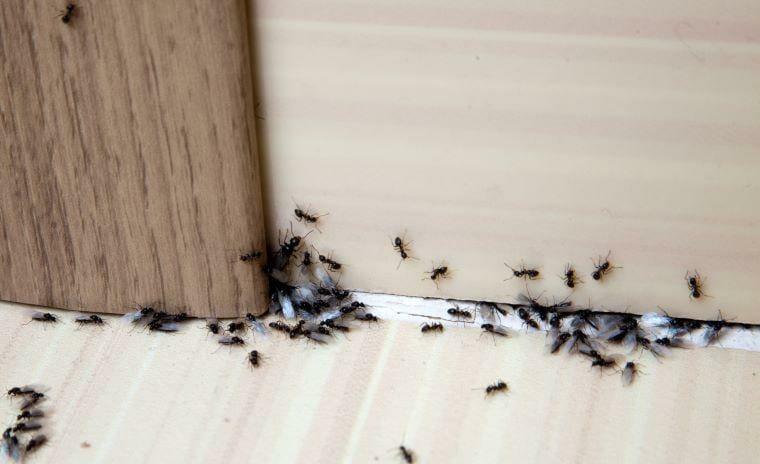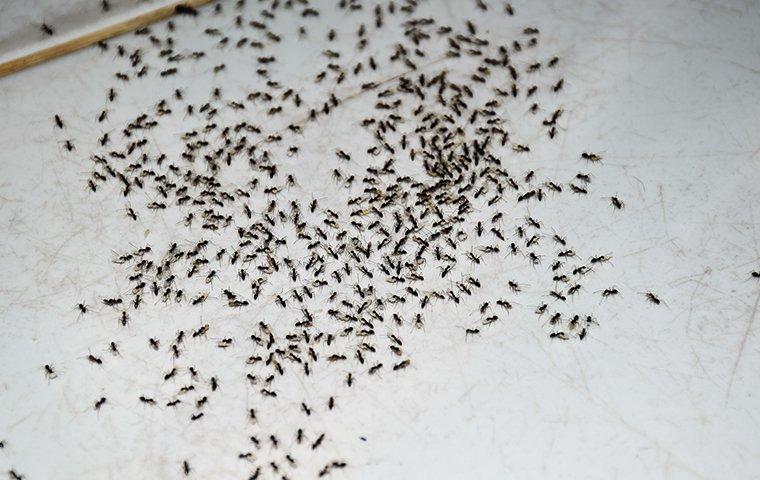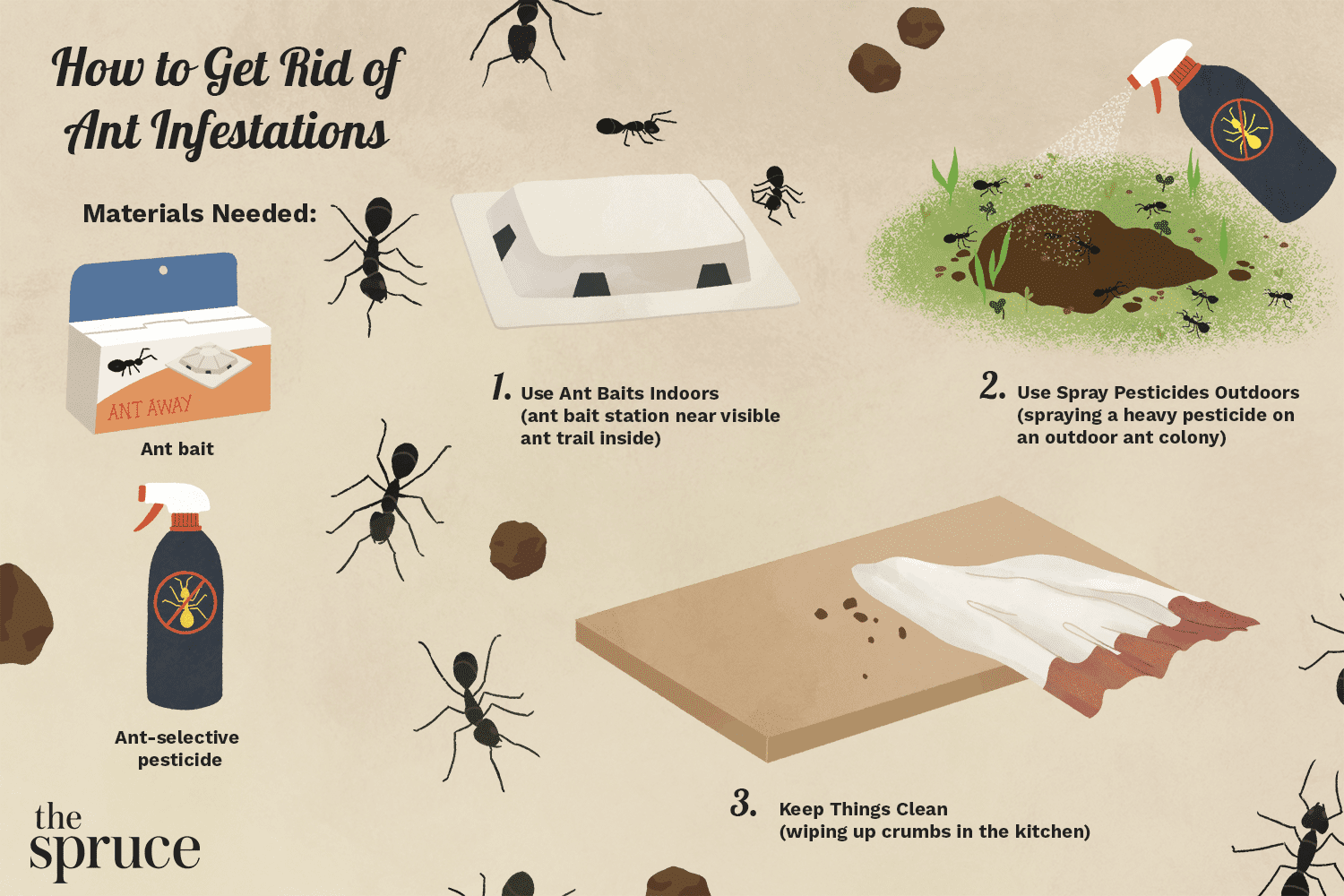To tackle an ant problem in your house, identify the type of ant and focus on sanitation and ant baits. Seal entry points to prevent further invasion.
Battling an ant invasion requires prompt and effective action. Recognizing the specific ant species is crucial as it dictates the treatment strategy. Kitchen areas are ant magnets due to food availability; therefore, keeping surfaces clean and storing food in sealed containers is essential.
Use targeted ant baits to eradicate the colony as they are more effective than sprays, which often only kill foraging ants. It’s important to find and seal cracks and openings around your home, as these serve as entry points for ants. A clean home, combined with proper use of ant baits, can greatly diminish the likelihood of future ant problems. Remember, persistent issues may require professional pest control services.

Credit: smithspestmanagement.com
Identifying Ant Infestations
Discovering an ant invasion can be unsettling. Recognizing the signs early can help manage the issue before it becomes a serious infestation. Identifying the type of ant and understanding their behavior is crucial for effective elimination.
Common Signs Of Ants In The Home
- Live ants: A large number of ants roaming around is a surefire sign.
- Ant pathways: Ants follow scent trails leading to food sources.
- Ant nests: Small piles of soil or debris indicate nesting sites.
Types Of Ants And Their Habitats
Different ants prefer various environments. Some like damp wood, while others favor dry areas.
| Ant Type | Habitat |
|---|---|
| Carpenter Ants | Moist wood in structures |
| Pavement Ants | Under stones, pavement cracks |
| Odorous House Ants | Near moisture sources, sweets |
Home Hygiene Practices To Prevent Ants
An ant-free home requires more than just a quick sweep. Implementing effective hygiene practices can make all the difference. Let’s explore how keeping your home spick and span can ward off these tiny invaders.
Regular Cleaning Routines
Sticking to a cleaning schedule is key. Ensure floors and surfaces remain crumb-free to deter ant trails. Here’s what you should do:
- Daily sweep or vacuum your floors.
- Wipe down countertops and tables after each meal.
- Clean up spills immediately, focusing on sugary substances.
- Weekly, mop floors and clean under appliances.
Proper Food Storage Techniques
Ants have a keen sense for sniffing out food. Keep them at bay with the following:
| Storage Area | Techniques |
|---|---|
| Pantry | Use sealed containers. Avoid open packages. |
| Refrigerator | Store sweet items like fruit in containers. |
| Countertops | Keep them clear. Store food in tight-lidded jars. |
Note: Do not leave pet food out overnight. Ants find it quickly.
Natural Remedies For Ant Control
Ants can be unwelcome guests in any home. Finding a natural solution to this problem is a top priority for households seeking a safe and eco-friendly approach. Natural remedies for ant control offer a way to keep these pesky insects at bay without the use of harsh chemicals. Explore various DIY repellents and plant-based strategies to protect your home in an environmentally-sound manner.
Diy Ant Repellent Solutions
Create effective ant repellents with items typically found in your kitchen or pantry. A mixture of equal parts water and white vinegar can deter ants when sprayed on common entry points. Citrus peels, such as lemon or orange, contain compounds that ants avoid, making them a natural deterrent when placed in areas of activity.
- Baking soda and sugar: A 1:1 mixture causes a reaction fatal to ants.
- Coffee grounds: Sprinkle in the garden to keep ants away.
- Cinnamon: Ground or in oil form, it disrupts ant pheromones.
- Essential oils: Peppermint, tea tree, and eucalyptus oils can be effective.
Beneficial Plants That Repel Ants
Incorporating certain plants into your garden or home can naturally keep ants at bay. These plants not only add beauty but serve as a powerful repellent against ants.
| Plant Name | Ant-Repelling Properties |
|---|---|
| Mint | Mint releases a strong aroma that ants avoid. |
| Lavender | The scent of lavender is offensive to ants. |
| Marigold | Contains pyrethrum, a natural insect repellent. |
| Tansy | Its bitter scent and taste deter ants and other pests. |

Credit: hawxpestcontrol.com
Chemical Ant Baits And Repellents
Combatting an ant infestation can feel like a never-ending battle. Yet, chemical ant baits and repellents remain a powerful arsenal in this fight. These methods use formulated poisons to attract and eliminate colonies. Understanding and safely applying these potent tools can lead to a pest-free home.
Selecting The Right Ant Poison
Finding the most effective ant poison involves recognizing the ant species and their habits. Ants may have preferences for sugars, proteins, or fats. Purchase baits aligned with these preferences. Read labels to ensure the poison is intended for the specific ant species. Below are key points to keep in mind when selecting ant poison:
- Identify the ant type to match with the correct bait.
- Choose baits for either indoor or outdoor infestations.
- Opt for child and pet-safe products when necessary.
Safety Precautions Using Chemical Treatments
While chemical treatments are effective, they come with risks. Prioritize safety by following the guidelines below:
- Read and follow the product’s instructions carefully.
- Wear gloves and avoid skin contact with poisons.
- Keep baits and repellents away from children and pets.
- Store chemicals in a secure place.
By adhering to these practices, you can maintain a safe environment while addressing your ant problem.
When To Call A Professional Exterminator
Ant infestations can start small but sometimes escalate beyond simple home remedies. Recognizing when to seek professional help is crucial for effective management. This section explores key factors that indicate the need for expert intervention.
Evaluating The Severity Of Ant Infestation
Initial signs of ants can be deceptive; a few scouts can quickly turn into a full-blown colony. Look for these telltale signs to assess the severity:
- Visible ant pathways in and outside your home.
- A large number of ants in your kitchen or pantry.
- Ants found in multiple areas of your house.
- Wood shavings or sounds indicating carpenter ant damage.
- Recurring ant sightings despite using home remedies.
If any of these signs are present, consider contacting a professional.
Cost-benefit Analysis Of Professional Services
| DIY Ant Control | Professional Extermination |
|---|---|
| Initial lower cost | Higher initial cost |
| May not eliminate source | Targets colony source |
| Repeated treatments needed | Long-term solutions |
| Time and effort intensive | Expertise saves time |
Evaluating both the short-term and long-term costs against the benefits highlights the value of professional services. An exterminator can provide a definitive solution, often supported by guarantees, reducing the likelihood of future infestations.

Credit: www.aikenpest.com
Long-term Strategies To Keep Ants Away
Ants in the home can be a persistent problem. It is essential to have long-term strategies to keep these unwelcome guests away.
Sealing Entry Points
Ants are tiny critters that find small cracks and crevices to enter homes. Conduct a thorough inspection of your home’s exterior. Look for gaps in window frames, doorways, and foundations. Use silicone caulk or foam sealant to close these openings. This creates a barrier that ants cannot cross. Make sure vents and chimneys have proper screens. It prevents ants and other pests from getting in.
Landscaping Adjustments
Yard maintenance plays a crucial role in ant prevention. Keep branches and shrubs trimmed away from your house. Direct contact with these greenways makes it easier for ants to enter. Ensure that mulch is not too close to your home’s foundation. It should be at least 6 inches away. Use stone or crushed rock borders as they serve as a natural deterrent. Maintain a clean yard free from debris and standing water where ants can thrive.
| Tactic | Action | Benefit |
|---|---|---|
| Seal Cracks | Use caulk or foam | Blocks ant entry |
| Trim Vegetation | Keep away from house | Removes access points |
| Adjust Mulch | Keep distance from base | Limits nest locations |
Frequently Asked Questions For How To Deal With Ant Problem In House
How Do I Permanently Get Rid Of Ants In My House?
To permanently eliminate ants, keep your house clean, seal entry points, and use ant baits or non-repellent insecticides. Consider professional pest control for severe infestations. Regular maintenance is key to preventing future issues.
Why Do I Have So Many Ants In My House?
Ants enter homes seeking food and shelter. Crumbs, spills, and accessible food attract them. Seal food containers and clean surfaces regularly to deter ant infestations.
Will Ants In House Eventually Go Away?
Ants in your house may eventually leave if their food source disappears. Persistent infestations require professional extermination or home ant control methods to completely eradicate them.
How Do I Get Rid Of Ants Permanently Overnight?
To permanently eliminate ants overnight, locate and destroy their nest, use ant baits for them to carry poison back, and seal off entry points to prevent future invasions. Ensure cleanliness to remove food sources that attract ants.
Conclusion
Tackling an ant infestation can be straightforward with the right approach. Remember, consistency is key to keeping these persistent pests at bay. Ensure your home remains clean, sealed, and protected against future invaders. With these tools and tips, you can reclaim your peaceful, ant-free living space.
Stay vigilant and persistent for the best results!

I’m MD Tanvir, and I bring years of expertise gained from working closely with pest control companies to the forefront. My journey in the industry has inspired me to launch Bug Battler, a platform aimed at equipping people with the know-how to combat pests autonomously. Through Bug Battler, I aim to empower individuals with practical insights to tackle pest infestations effectively.

